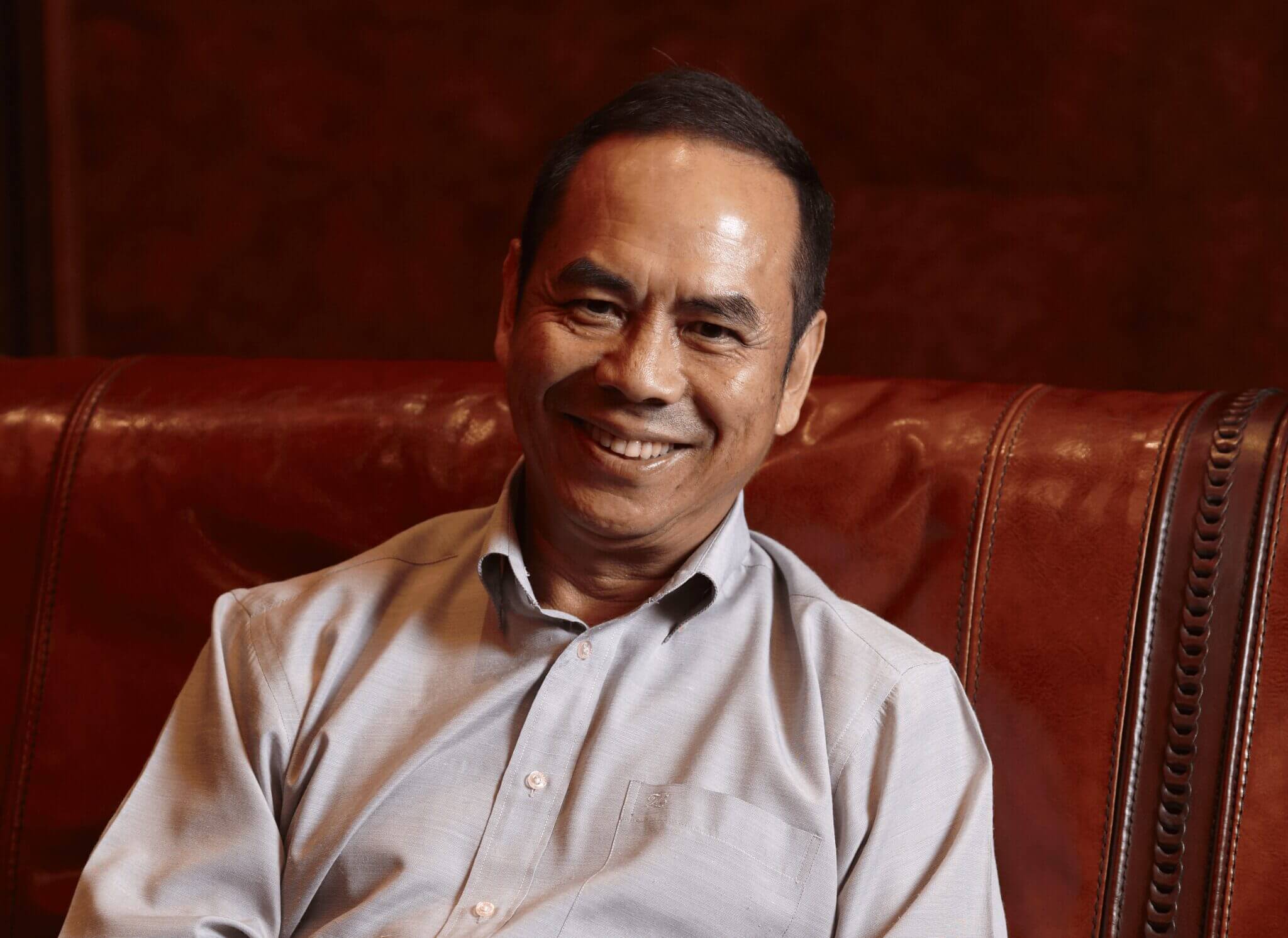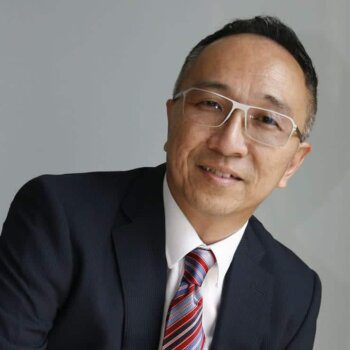In 1955, Sam Goi left his hometown Fuqing in Fujian province at the age of six and came to Singapore to seek a better life with his family. An entrepreneur at heart, he left school in his teenage years and started businesses including motor rewinding and ship repairing.
However, he soon recognized the global reach and potential of the F&B industry and acquired Tee Yih Jia in 1977. In 1979 he returned to his hometown to build schools and improved the standard of living for his rural brethren, believing that education is the first step towards ending poverty. He went on to build a factory in 1985, Guan Hui Food Enterprise, manufacturing spring rolls and created employment opportunities in Fuqing.
Using the factory as basis, he negotiated for support from the provincial government to build much needed basic public infrastructures like electricity, water and roads to further develop the community. He was once asked what made him set up factory in a location where roads didn’t even exist, and he replied “?人看不到的你却看到了,?才是机会。路,是人一步一步 走出来的。”
As a pioneer Chinese immigrant returning to support and build his hometown, he contributed to the early social and economic developments of the mainland even before Singapore and China formally established diplomatic relations in 1990. Since then, he has further strengthened diplomatic ties between the countries by championing bilateral relations through his work with Network China, IE Singapore, Singapore-Zhejiang Economic Trade Council, Su- Tong Science and Technology Park and providing advisory and consultative assistance for several Chinese provinces. His foresight and confidence in China’s emergence, as well as his desire to return to his hometown, has enabled him to build a business empire spanning F&B, technology and property in China, Singapore and the region.
Sam Goi, the Executive Chairman of Tee Yih Jia Group, acquired the company in 1977 and built it into the global food manufacturing group it is today.
Tee Yih Jia produces its world-famous spring roll skins and a wide range of ready-to-eat Asian convenience foods such as spring rolls, roti paratha, crepes, mini prawn rolls, glutinous rice balls and samosas. It currently sells its Asian food products in over 100 countries including North America, Europe, Russia, Middle East, Australia, China, Japan and the rest of Asia Pacific. It is the largest spring roll pastry manufacturer in the world, with production output of over 35 million pieces a day being exported globally. Tee Yih Jia was awarded first place among Singapore’s best 50 companies at the Enterprise 50 Awards in 2000.
In 1986 under his abled leadership, Tee Yih Jia became the first medium-sized company to win the highly coveted National Productivity Award from then Prime Minister Mr Lee Kuan Yew. In the same year, Tee Yih Jia also received the inaugural Business Times/DHL International Enterprise Award from the current Prime Minister Mr Lee Hsien Loong.
Having foresight and confidence in China’s emergence, Mr Goi had invested heavily in the country since the 1980s, and has since built up extensive experience and network doing business there. He set up four food factories in his hometown of Fuqing and created employment opportunities for a few thousand workers – Guan Hui Food Enterprise (1988); Mico Food Enterprise (1991); Ming Wei Food Enterprise (2004); Fujian Ryushobo (2006). In the USA, Mr Goi acquired Main On Foods in California for USD20 million in 1988.
As a leader in the F&B industry, Mr Goi – through Tee Yih Jia’s production capabilities – lent Chinese food products more credibility with his drive to consistently manufacture products of high quality and food safety standards. Bridging Singapore and China in an exchange of ideas and innovation, Mr Goi brought Tee Yih Jia to China in the 1980s, employing a few thousand workers to expand its manufacturing capacity and tap on the incredible market size and potential. He led his manufacturing facility in Fuqing, Fujian to become the first food company in China to receive European Union clearance to export seafood products to Europe.
He later founded Junhe Real Estate Group – a Yangzhou-based property developer which has a track record for quality homes having fully sold more than 16 million square feet in four prestigious developments in Yangzhou, Nanjing, Nantong and larger Jiangsu region. Currently, the developer continues to have many prominent ongoing projects within the Tianjin region.
Mr Goi is the Vice Chairman of Network China and IE Singapore’s regional representative for Fuzhou City and Fujian Province. He is a member of the Singapore Zhejiang Economic & Trade Council and a Senior Consultant for the Su-Tong Science and Technology Park and Advisor to several China provinces. He also served as the Enterprise 50 Club’s President and is now the Honorary Past President. He was a member of Business China and Singapore Manufacturers’ Federation (SMF).
Mr Goi was bestowed Honorary Resident of Yangzhou and Yixing. For his consistent charitable work over the years, he was awarded the “Outstanding Contribution” (Gold) Medal by the Fujian provincial government. Mr Goi retains his core Chinese values his family instilled in him since young. He is also noted among his peers for his strong sense of integrity. One of his favourite quotes, “天?地利人和” which describes timing as a key factor to business success – Mr Goi often says, “I was at the right place at the right time, doing the right thing, with the right people”.
Mr Goi was a winner of Ernst & Young’s “Entrepreneur of the Year” Award in 2004. A decade later, he was conferred the highest business accolade of “Businessman of the Year” at the Singapore Business Awards in 2014 and “SG50 Outstanding Chinese Business Pioneers Award” in 2015. Mr Goi was also invited to the Forbes Global CEO Conference in 2013 (Bali, Indonesia) and in 2014 (Singapore) where he shared his thoughts and ideas on his businesses. Touching base on how countries such as China aid in the expansion of global companies, as well as the increasingly complex challenges and constantly evolving environment of an entrepreneur facing the modern business landscape.
He was ranked by Forbes Asia in July 2014 as the 13th richest man in Singapore with a net worth of US$2.1 billion and has made it to the Forbes World’s Billionaires list in 2015, ranked 894th.
Mr Goi believes that he owes much of his business success to his family and the community. Hence, he contributes actively and generously to several organisations and associations in industries such as education, sports and the arts. His monetary and service contributions have both had a great impact in sculpting Singapore’s development, and nurturing the next generation of leaders.
Sam Goi is the recipient of the Lifetime Achievement Award of the Asia Pacific Entrepreneurship Awards 2015 Singapore. The Awards were held on 14th August 2015 at Singapore Marriott Tang Plaza Hotel.





























